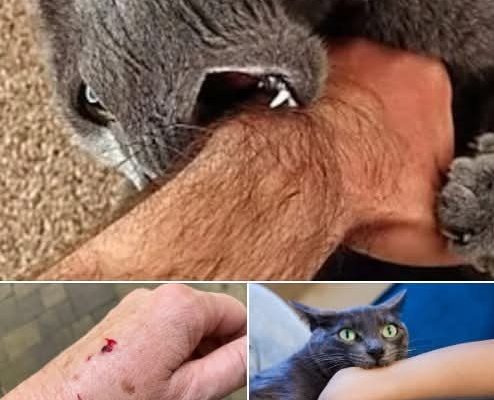Anyone who’s shared their life with a cat knows just how delightfully quirky they can be. My old cat loved chasing mice, curling up beside me, and turning everything into a game. But every so often, out of the blue, he’d give me a little bite—not enough to hurt, but always enough to make me wonder: What was that about?
Does your cat ever bite you too? Here’s what it might actually mean:

Why Cats Bite: Understanding the Reasons
1. Playfulness
Cats are naturally curious and playful, and sometimes, that playfulness comes with a nip or two. These gentle bites usually happen when a cat is overstimulated during play. While they aren’t meant to hurt (and usually don’t break the skin), they can still be surprising—and yes, a little painful!
2. Love Bites
Believe it or not, cats sometimes bite as a sign of affection. A soft nibble may be your cat’s way of saying, “I like you!” These gentle bites often happen when a cat is purring or enjoying being petted.
“They may be saying, ‘I’m enjoying this interaction, but it’s becoming too much. I’m reaching my limit,’” explains Samantha Bell, cat expert at Best Friends Animal Society.
Affectionate nips can also be a cat’s subtle way of asking for food, more petting, or simply your attention. Far from aggression, they’re often just quirky ways cats communicate their needs and deepen their bond with you.
3. Overstimulation
Just like people, cats can become overwhelmed. Too much petting, noise, or physical interaction can lead to sensory overload. When that happens, a quick bite may be their way of saying, “I need a break.” Learning to recognize the signs of overstimulation—such as twitching tails or flattened ears—can help avoid these moments.
4. Fear or Stress
If a cat feels threatened, cornered, or scared, biting becomes a natural defense. It’s their way of protecting themselves when they sense danger—even if the threat isn’t obvious to you.
5. Pain or Discomfort
Sudden biting—especially from a cat that’s usually calm—can sometimes be a red flag. It might be their way of signaling pain or illness. If your cat starts biting out of nowhere, a visit to the vet is a smart move to rule out any hidden health issues.
6. Territorial Behavior
Cats are famously territorial. If they feel like their space, favorite napping spot, or cherished toy is being invaded, they might bite to assert control. This instinctive behavior is rooted in their wild ancestry, where protecting territory was key to survival.
7. Kittens and Young Cats
Kittens love to bite during play—it’s how they learn about boundaries. But allowing them to bite your hands or feet might send the wrong message. If not corrected early, this behavior can continue into adulthood, and those playful nips can turn painful fast.
To avoid this, redirect their biting to toys. Teaching young cats that human skin isn’t a toy helps them grow into gentle, well-behaved adults and fosters a safer, happier relationship for both of you.

What to Do If You Get Bitten
Even small cat bites can pose a serious risk. A cat’s sharp teeth can puncture the skin and introduce harmful bacteria deep into the tissue, potentially leading to infection.
If you’re bitten, here’s how to treat the wound properly:
- Clean the bite immediately with mild soap and running water.
- Apply an antiseptic solution to disinfect the area.
- Cover the wound with a clean, sterile bandage.
If the bite becomes red, swollen, or painful—or if you develop a fever—seek medical attention right away. Cat bites can lead to infections like cellulitis or even more severe complications if left untreated.

Final Thoughts
The key is to pay attention to the context and your cat’s body language. With a little awareness and understanding, you can strengthen your bond and ensure that both you and your furry friend feel safe and connected.


